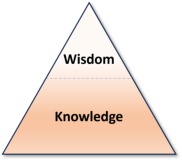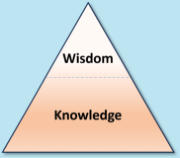
How Do You Define Wisdom?
Here are a few questions to consider. Take time to consider each of your answers.
1
.
If someone asked you to define wisdom…how would you respond? What is wisdom to you?
2
.
Can you identify one person you consider as being wise? How did they demonstrate wisdom?
3
.
Can you identify a knowledgeable person who was unwise? What did they do or fail to do?
4
.
Is there a difference between knowledge and wisdom? If yes, what is the difference?
Knowledge
Some
perceive
knowledge
as
wisdom.
However,
knowledge
and
wisdom
are
unique.
For
example,
it
is
possible
for
one
to
have
significant
knowledge,
but
lack
wisdom.
But
for
one
who
is
wise,
their
wisdom
improves
as
knowledge
is
increased.
Knowledge
may
be
defined
as
information
and
skills
that
are
acquired
through formal education, interaction with others, and experiences in life.
Human Wisdom vs. Godly Wisdom
There
are
two
types
of
wisdom:
human
and
godly.
Human
wisdom
may
be
defined
as
when
someone
uses
their
personal
knowledge
and
skills
when
making
decisions,
judgements
and
declarations.
This
type
of
wisdom
is
obtained
from
human
sources,
and
is
executed
with
human
reasoning.
However,
there
is
a
different
type
of
wisdom
that
few
find:
godly
wisdom.
Godly
wisdom
is
only
received
spiritually
via
the
Holy
Spirit,
is
foundationally
based
upon
God’s
absolute
truths,
and
enhances
the
love
one
has
in
their heart towards God, and towards others.
The
following
scripture
compares
human
vs.
godly
wisdom.
As
you
read,
identify
at
least
5
descriptive
words that indicate human wisdom, and at least 5 descriptive words that indicate godly wisdom.
“Who
is
wise
and
understanding
among
you?
Let
him
show
by
good
conduct
that
his
works
are
done
in
the
meekness
of
wisdom.
But
if
you
have
bitter
envy
and
self-seeking
in
your
hearts,
do
not
boast
and
lie
against
the
truth.
This
wisdom
does
not
descend
from
above,
but
is
earthly,
sensual,
demonic.
For
where
envy
and
self-seeking
exist,
confusion
and
every
evil
thing
are
there.
But
the
wisdom
that
is
from
above
is
first
pure,
then
peaceable,
gentle,
willing
to
yield,
full
of
mercy
and
good
fruits,
without
partiality
and without hypocrisy.” James 3:13-17
Wisdom Litmus Test
Jesus
was
asked
what
was
the
greatest
commandment.
Jesus
responded,
“You
shall
love
the
Lord
your
God
with
all
your
heart,
with
all
your
soul,
and
with
all
your
mind.
This
is
the
first
and
great
commandment.
And
the
second
is
like
it:
You
shall
love
your
neighbor
as
yourself.
On
these
two
commandments hang all the Law and the Prophets.” Matthew 22:37-40
Think
about
it…all
of
the
commandments
God
has
given
to
man;
and
all
of
the
words
spoken
by
God
through
the
prophets;
and
all
of
the
words
in
the
Bible
may
be
summarized
by
two
directives:
Love
God
with
everything
you
got,
and
love
others.
If
we
do
these
two
things,
all
of
the
commandments—and
God’s
desire
for
us—will
be
fulfilled.
For
the
Bible
states
in
Romans
13:10,
“Love
is
the
fulfillment
of
the
law.”
Given
the
absolute
truth
declared
by
Jesus,
if
“wisdom”
does
not
magnify
love
towards
God
and
others…then
this
wisdom
is
likely
human
wisdom.
For
this
question
comprises
the
spiritual
“litmus
test”
of
human
versus
godly
wisdom.
Godly
wisdom
facilitates
the
fulfillment
of
the
greatest
commandment:
to
love
God
with
all
of
our
being,
and
seek
to
fulfill
the
needs
of
others.
Whereas,
human
wisdom
lacks
the eternal benefits associated with godly wisdom.
How to Obtain Godly Wisdom
“The
knowledge
of
the
mystery
of
God,
both
of
the
Father
and
of
Christ,
in
whom
are
hidden
all
the
treasures of wisdom and knowledge.” Colossians 2:2
Those
who
desire
God;
those
who
seek
Him;
those
who
obtain
knowledge
about
Him
and
His
Son;
and
those
who
believe
and
accept
Jesus
as
their
Savior
and
Lord—are
those
to
whom
the
Holy
Spirit
(1)
imparts
knowledge
as
He
reveals
the
mystery
of
God,
and
(2)
enables
us
to
obtain
the
rewards
from
the
treasures of His wisdom. In addition…
•
Godly wisdom is an indicator of spiritual growth.
•
Godly wisdom illuminates spiritual understanding, discernment, and the consequences of sin.
•
Godly wisdom transforms us into the image of His Son, Jesus Christ.
•
Godly wisdom creates a compelling desire to seek and obey Him—as an expression of our love.
•
Godly wisdom causes us to recognize it is only by His grace and His love for us that we are saved.
•
Godly wisdom replaces pride with humility, and self-reliance with dependence upon Him.
•
Godly wisdom causes us to realize it’s not about us and our self-centered ways.
•
Godly
wisdom
results
in
the
realization
that
a
fulfilled
life
is
about
sharing
the
transformational
power
of God’s love and His grace with others.
•
Godly wisdom elevates our perceptions from the earthly realm and into the spiritual realm.
•
Godly wisdom magnifies His love within our heart, soul and mind.
“If
any
of
you
lacketh
wisdom,
let
him
ask
of
God,
who
giveth
to
all
liberally
and
upbraideth
not;
and
it
shall be given him.” James 1:5
King
Solomon
of
Israel—the
one
who
wrote
the
Song
of
Solomon,
the
book
of
Ecclesiastes,
and
much
of
Proverbs;
the
one
who
sought
after
God;
the
one
who
declared
life
lived
apart
from
God
is
meaningless
when
compared
to
education,
wealth,
or
any
other
earthly
pleasures—is
recognized
throughout
time
for
his God-given wisdom.
“On
that
night
God
appeared
to
Solomon,
and
said
to
him,
‘Ask!
What
shall
I
give
you?’
And
Solomon
said
to
God:
‘You
have
shown
great
mercy
to
David
my
father,
and
have
made
me
king
in
his
place.
Now,
O
Lord
God,
let
Your
promise
to
David
my
father
be
established,
for
You
have
made
me
king
over
a
people
like
the
dust
of
the
earth
in
multitude.
Now
give
me
wisdom
and
knowledge,
that
I
may
go
out
and
come
in
before
this
people;
for
who
can
judge
this
great
people
of
Yours?’
Then
God
said
to
Solomon:
‘Because
this
was
in
your
heart,
and
you
have
not
asked
riches
or
wealth
or
honor
or
the
life
of
your
enemies,
nor
have
you
asked
long
life—but
have
asked
wisdom
and
knowledge
for
yourself,
that
you
may
judge
My
people
over
whom
I
have
made
you
king—wisdom
and
knowledge
are
granted
to
you;
and
I
will
give
you
riches
and
wealth
and
honor,
such
as
none
of
the
kings
have
had
who
were
before you, nor shall any after you have the like.’” 2 Chronicles 1:7-12
Consequences of Human Wisdom
Human
wisdom—revered
over
the
millennia—often
serves
as
a
means
to
denounce
the
existence
of
God, justify sin; is foundationally based upon deceptional lies; and misdirects from God’s truths.
“Beware
lest
anyone
cheat
you
through
philosophy
and
empty
deceit,
according
to
the
tradition
of
men,
according
to
the
basic
principles
of
the
world,
and
not
according
to
Christ.
For
in
Him
dwells
all
the
fullness
of
the
Godhead
bodily;
and
you
are
complete
in
Him,
who
is
the
head
of
all
principality
and
power.” Colossians 2:8-10
In
addition,
the
reason
why
the
someone
does
not
seek
God’s
wisdom
(and
they
embrace
human
wisdom)
is
because
God’s
wisdom
does
not
align
with
the
lies
that
keep
them
under
the
bondage
of
their
sin.
“Let
no
one
deceive
himself.
If
anyone
among
you
seems
to
be
wise
in
this
age,
let
him
become
a
fool
that
he
may
become
wise.
For
the
wisdom
of
this
world
is
foolishness
with
God.
For
it
is
written,
‘He
catches
the
wise
in
their
own
craftiness;’
and
again,
‘The
Lord
knows
the
thoughts
of
the
wise,
that
they
are futile.’” 1 Corinthians 3:18-20
Human and Godly Wisdom In Action
Here
is
a
comparison
between
how
one
may
respond
to
a
challenging
situation.
It
is
safe
to
say
that
each
of
us
can
relate
to
the
left
side
of
the
table…because
we
are
all
guilty
of
believing
in
our
vain
wisdom, and we have all experienced the negative consequences.
God’s truths enhance our spiritual understanding,
and cleanses our soul from the dirt and grime accumulated from the consequences of sin.
The Next Step
“Yes,
if
you
cry
out
for
discernment,
and
lift
up
your
voice
for
understanding,
if
you
seek
her
as
silver,
and
search
for
her
as
for
hidden
treasures;
then
you
will
understand
the
fear
of
the
Lord,
and
find
the
knowledge
of
God.
For
the
Lord
gives
wisdom;
from
His
mouth
come
knowledge
and
understanding;
He
stores
up
sound
wisdom
for
the
upright;
He
is
a
shield
to
those
who
walk
uprightly;
He
guards
the
paths
of
justice,
and
preserves
the
way
of
His
saints.
Then
you
will
understand
righteousness
and
justice,
equity
and
every
good
path.
When
wisdom
enters
your
heart,
and
knowledge
is
pleasant
to
your
soul,
discretion will preserve you; understanding will keep you.” Proverbs 2:3-11
Holy
God;
in
the
name
of
Jesus
Christ,
my
Savior
and
my
Lord;
I
ask
for
Your
wisdom.
Holy
Spirit,
I
open
my
heart,
my
mind
and
my
soul
to
Your
guidance
as
You
expand
my
knowledge
of
the
mystery
of
God
and
reveal
the
treasures
of
His
wisdom.
Teach
me
how
to
love
God
with
all
of
my
being;
help
me
to
express
His
love
towards
others;
and
help
me
to
glorify
God
in
all
that
I
do—for
nothing
else
is
worthy.
Amen.
“Let
not
the
wise
man
glory
in
his
wisdom,
let
not
the
mighty
man
glory
in
his
might,
nor
let
the
rich
man
glory
in
his
riches;
but
let
him
who
glories
glory
in
this,
that
he
understands
and
knows
Me,
that
I
am
the
Lord,
exercising
lovingkindness,
judgment,
and
righteousness
in
the
earth.
For
in
these
I
delight,
says
the Lord.” Jeremiah 9:23-24
May God richly bless you with His understanding, His knowledge, and His wisdom.
Harold D. Thomas
Bible Study Thought-Provoking Questions
The
purpose
of
the
questions
is
to
facilitate
a
deeper
understanding
of
the
Bible,
this
Bible
study
topic,
and
ourselves.
The
questions
may
be
answered
by
each
reader,
or
used
by
a
Bible
study
group
leader,
or
church
pastor.
The
questions
should
be
answered
or
discussed
after
reading
“Wisdom.”
In
addition,
the
questions
are
designed
to
enhance
learning
via
the
determination
of
personal
opinions
and/or
discovering how the lesson content relates to our personal lives. As such, no answers are provided.
Questions
This
lesson
began
by
asking
how
you
define
wisdom.
After
completing
the
reading
has
your
perception
of wisdom changed? If yes, explain.
What is the interrelationship between knowledge and wisdom, and can you have one without the other?
A
litmus
test
for
wisdom
(human
or
godly)
is
based
upon
to
what
degree
the
wisdom
magnifies
love
towards God and others.
•
Do you agree or disagree? Explain.
•
Looking
back
in
time
when
you
responded
to
a
situation…is
this
litmus
test
relevant?
Does
it
provide
a different and insightful perspective of what occurred?
•
Looking
forward,
is
this
litmus
test
a
good
thing
to
add
to
your
thoughts
when
confronted
with
a
challenging situation? Explain.
Can you identify:
•
At least 3 negative consequences of human wisdom, and 3 positive benefits of godly wisdom?
•
At least 3 positive benefits of human wisdom, and 3 negative consequences of godly wisdom?
The
lesson
states,
“God’s
truths
enhance
our
understanding,
and
cleanses
our
soul
from
the
dirt
and
grime accumulated from the consequences of sin.”
•
How does God’s truth enhance our understanding? Can you provide examples?
•
How can sin deposit and accumulate dirt and grime within our soul?
o
What does “dirt and grime” represent?
o
What are the consequences of dirt and grime?
o
Have you ever felt spiritually “slimy” due to an evil person, or when in a sinful environment?
•
How does God’s truth cleanse our soul?
What must one do to obtain and enhance godly wisdom?
You may download a PDF version of the questions by clicking on this button.
Can you think of someone who may benefit from this lesson? If yes,
CLICK HERE
for more info.




The words of Jesus Christ are in
red text.







The words of Jesus
are in red text.
How Do You Define Wisdom?
Here
are
a
few
questions
to
consider.
Take
time
to
consider each of your answers.
1
.
If
someone
asked
you
to
define
wisdom…how
would
you respond? What is wisdom to you?
2
.
Can
you
identify
one
person
you
consider
as
being
wise? How did they demonstrate wisdom?
3
.
Can
you
identify
a
knowledgeable
person
who
was
unwise? What did they do or fail to do?
4
.
Is
there
a
difference
between
knowledge
and
wisdom? If yes, what is the difference
?
Knowledge
Some
perceive
knowledge
as
wisdom.
However,
knowledge
and
wisdom
are
unique.
For
example,
it
is
possible
for
one
to
have
significant
knowledge,
but
lack
wisdom.
But
for
one
who
is
wise,
their
wisdom
improves
as
knowledge
is
increased.
Knowledge
may
be
defined
as
information
and
skills
that
are
acquired
through
formal
education,
interaction
with
others, and experiences in life.
Human Wisdom vs. Godly Wisdom
There
are
two
types
of
wisdom:
human
and
godly.
Human
wisdom
may
be
defined
as
when
someone
uses
their
personal
knowledge
and
skills
when
making
decisions,
judgements
and
declarations.
This
type
of
wisdom
is
obtained
from
human
sources,
and
is
executed
with
human
reasoning.
However,
there
is
a
different
type
of
wisdom
that
few
find:
godly
wisdom.
Godly
wisdom
is
only
received
spiritually
via
the
Holy
Spirit,
is
foundationally
based
upon
God’s
absolute
truths,
and
enhances
the
love
one
has
in
their
heart
towards
God,
and towards others.
The
following
scripture
compares
human
vs.
godly
wisdom.
As
you
read,
identify
at
least
5
descriptive
words
that
indicate
human
wisdom,
and
at
least
5
descriptive
words that indicate godly wisdom.
“Who
is
wise
and
understanding
among
you?
Let
him
show
by
good
conduct
that
his
works
are
done
in
the
meekness
of
wisdom.
But
if
you
have
bitter
envy
and
self-seeking
in
your
hearts,
do
not
boast
and
lie
against
the
truth.
This
wisdom
does
not
descend
from
above,
but
is
earthly,
sensual,
demonic.
For
where
envy
and
self-
seeking
exist,
confusion
and
every
evil
thing
are
there.
But
the
wisdom
that
is
from
above
is
first
pure,
then
peaceable,
gentle,
willing
to
yield,
full
of
mercy
and
good
fruits,
without
partiality
and
without
hypocrisy.”
James
3:13-17
Wisdom Litmus Test
Jesus
was
asked
what
was
the
greatest
commandment.
Jesus
responded,
“You
shall
love
the
Lord
your
God
with
all
your
heart,
with
all
your
soul,
and
with
all
your
mind.
This
is
the
first
and
great
commandment.
And
the
second
is
like
it:
You
shall
love
your
neighbor
as
yourself.
On
these
two
commandments
hang
all
the
Law
and
the
Prophets.” Matthew 22:37-40
Think
about
it…all
of
the
commandments
God
has
given
to
man;
and
all
of
the
words
spoken
by
God
through
the
prophets;
and
all
of
the
words
in
the
Bible
may
be
summarized
by
two
directives:
Love
God
with
everything
you
got,
and
love
others.
If
we
do
these
two
things,
all
of
the
commandments—and
God’s
desire
for
us—will
be
fulfilled.
For
the
Bible
states
in
Romans
13:10,
“Love
is
the fulfillment of the law.”
Given
the
absolute
truth
declared
by
Jesus,
if
“wisdom”
does
not
magnify
love
towards
God
and
others…then
this
wisdom
is
likely
human
wisdom.
For
this
question
comprises
the
spiritual
“litmus
test”
of
human
versus
godly
wisdom.
Godly
wisdom
facilitates
the
fulfillment
of
the
greatest
commandment:
to
love
God
with
all
of
our
being,
and
seek
to
fulfill
the
needs
of
others.
Whereas,
human
wisdom
lacks
the
eternal
benefits
associated
with
godly wisdom.
How to Obtain Godly Wisdom
“The
knowledge
of
the
mystery
of
God,
both
of
the
Father
and
of
Christ,
in
whom
are
hidden
all
the
treasures
of
wisdom and knowledge.” Colossians 2:2
Those
who
desire
God;
those
who
seek
Him;
those
who
obtain
knowledge
about
Him
and
His
Son;
and
those
who
believe
and
accept
Jesus
as
their
Savior
and
Lord—are
those
to
whom
the
Holy
Spirit
(1)
imparts
knowledge
as
He
reveals
the
mystery
of
God,
and
(2)
enables
us
to
obtain
the
rewards
from
the
treasures
of
His
wisdom.
In
addition…
•
Godly wisdom is an indicator of spiritual growth.
•
Godly
wisdom
illuminates
spiritual
understanding,
discernment, and the consequences of sin.
•
Godly
wisdom
transforms
us
into
the
image
of
His
Son, Jesus Christ.
•
Godly
wisdom
creates
a
compelling
desire
to
seek
and obey Him—as an expression of our love.
•
Godly
wisdom
causes
us
to
recognize
it
is
only
by
His
grace and His love for us that we are saved.
•
Godly
wisdom
replaces
pride
with
humility,
and
self-
reliance with dependence upon Him.
•
Godly
wisdom
causes
us
to
realize
it’s
not
about
us
and our self-centered ways.
•
Godly
wisdom
results
in
the
realization
that
a
fulfilled
life
is
about
sharing
the
transformational
power
of
God’s love and His grace with others.
•
Godly
wisdom
elevates
our
perceptions
from
the
earthly realm and into the spiritual realm.
•
Godly
wisdom
magnifies
His
love
within
our
heart,
soul and mind.
“If
any
of
you
lacketh
wisdom,
let
him
ask
of
God,
who
giveth
to
all
liberally
and
upbraideth
not;
and
it
shall
be
given him.” James 1:5
King
Solomon
of
Israel—the
one
who
wrote
the
Song
of
Solomon,
the
book
of
Ecclesiastes,
and
much
of
Proverbs;
the
one
who
sought
after
God;
the
one
who
declared
life
lived
apart
from
God
is
meaningless
when
compared
to
education,
wealth,
or
any
other
earthly
pleasures—is
recognized
throughout
time
for
his
God-
given wisdom.
“On
that
night
God
appeared
to
Solomon,
and
said
to
him,
‘Ask!
What
shall
I
give
you?’
And
Solomon
said
to
God:
‘You
have
shown
great
mercy
to
David
my
father,
and
have
made
me
king
in
his
place.
Now,
O
Lord
God,
let
Your
promise
to
David
my
father
be
established,
for
You
have
made
me
king
over
a
people
like
the
dust
of
the
earth
in
multitude.
Now
give
me
wisdom
and
knowledge,
that
I
may
go
out
and
come
in
before
this
people;
for
who
can
judge
this
great
people
of
Yours?’
Then
God
said
to
Solomon:
‘Because
this
was
in
your
heart,
and
you
have
not
asked
riches
or
wealth
or
honor
or
the
life
of
your
enemies,
nor
have
you
asked
long
life—but
have
asked
wisdom
and
knowledge
for
yourself,
that
you
may
judge
My
people
over
whom
I
have
made
you
king—wisdom
and
knowledge
are
granted
to
you;
and
I
will
give
you
riches
and
wealth
and
honor,
such
as
none
of
the
kings
have
had
who
were
before
you,
nor
shall
any
after
you
have the like.’” 2 Chronicles 1:7-12
Consequences of Human Wisdom
Human
wisdom—revered
over
the
millennia—often
serves
as
a
means
to
denounce
the
existence
of
God,
justify
sin;
is
foundationally
based
upon
deceptional
lies;
and misdirects from God’s truths.
“Beware
lest
anyone
cheat
you
through
philosophy
and
empty
deceit,
according
to
the
tradition
of
men,
according
to
the
basic
principles
of
the
world,
and
not
according
to
Christ.
For
in
Him
dwells
all
the
fullness
of
the
Godhead
bodily;
and
you
are
complete
in
Him,
who
is
the
head
of
all principality and power.” Colossians 2:8-10
In
addition,
the
reason
why
the
someone
does
not
seek
God’s
wisdom
(and
they
embrace
human
wisdom)
is
because
God’s
wisdom
does
not
align
with
the
lies
that
keep them under the bondage of their sin.
“Let
no
one
deceive
himself.
If
anyone
among
you
seems
to
be
wise
in
this
age,
let
him
become
a
fool
that
he
may
become
wise.
For
the
wisdom
of
this
world
is
foolishness
with
God.
For
it
is
written,
‘He
catches
the
wise
in
their
own
craftiness;’
and
again,
‘The
Lord
knows
the
thoughts
of
the
wise,
that
they
are
futile.’”
1
Corinthians 3:18-20
Human and Godly Wisdom In Action
Here
is
a
comparison
between
how
one
may
respond
to
a
challenging
situation.
It
is
safe
to
say
that
each
of
us
can
relate
to
the
left
side
of
the
table…because
we
are
all
guilty
of
believing
in
our
vain
wisdom,
and
we
have
all
experienced the negative consequences.
God’s truths enhance our spiritual understanding,
and cleanses our soul from the dirt and grime
accumulated from the consequences of sin.
The Next Step
“Yes,
if
you
cry
out
for
discernment,
and
lift
up
your
voice
for
understanding,
if
you
seek
her
as
silver,
and
search
for
her
as
for
hidden
treasures;
then
you
will
understand
the
fear
of
the
Lord,
and
find
the
knowledge
of
God.
For
the
Lord
gives
wisdom;
from
His
mouth
come
knowledge
and
understanding;
He
stores
up
sound
wisdom
for
the
upright;
He
is
a
shield
to
those
who
walk
uprightly;
He
guards
the
paths
of
justice,
and
preserves
the
way
of
His
saints.
Then
you
will
understand
righteousness
and
justice,
equity
and
every
good
path.
When
wisdom
enters
your
heart,
and
knowledge
is
pleasant
to
your
soul,
discretion
will
preserve
you;
understanding
will
keep
you.” Proverbs 2:3-11
Holy
God;
in
the
name
of
Jesus
Christ,
my
Savior
and
my
Lord;
I
ask
for
Your
wisdom.
Holy
Spirit,
I
open
my
heart,
my
mind
and
my
soul
to
Your
guidance
as
You
expand
my
knowledge
of
the
mystery
of
God
and
reveal
the
treasures
of
His
wisdom.
Teach
me
how
to
love
God
with
all
of
my
being;
help
me
to
express
His
love
towards
others;
and
help
me
to
glorify
God
in
all
that
I
do—for
nothing else is
worthy. Amen.
“Let
not
the
wise
man
glory
in
his
wisdom,
let
not
the
mighty
man
glory
in
his
might,
nor
let
the
rich
man
glory
in
his
riches;
but
let
him
who
glories
glory
in
this,
that
he
understands
and
knows
Me,
that
I
am
the
Lord,
exercising
lovingkindness,
judgment,
and
righteousness
in
the
earth.
For
in
these
I
delight,
says
the
Lord.”
Jeremiah 9:23-24
May
God
richly
bless
you
with
His
understanding,
His
knowledge, and His wisdom.
Harold D. Thomas
Bible Study Thought-Provoking Questions
The
purpose
of
the
questions
is
to
facilitate
a
deeper
understanding
of
the
Bible,
this
Bible
study
topic,
and
ourselves.
The
questions
may
be
answered
by
each
reader,
or
used
by
a
Bible
study
group
leader,
or
church
pastor.
The
questions
should
be
answered
or
discussed
after
reading
“Wisdom.”
In
addition,
the
questions
are
designed
to
enhance
learning
via
the
determination
of
personal
opinions
and/or
discovering
how
the
lesson
content
relates
to
our
personal
lives.
As
such,
no
answers are provided.
Questions
This
lesson
began
by
asking
how
you
define
wisdom.
After
completing
the
reading
has
your
perception
of
wisdom changed? If yes, explain.
What
is
the
interrelationship
between
knowledge
and
wisdom, and can you have one without the other?
A
litmus
test
for
wisdom
(human
or
godly)
is
based
upon
to
what
degree
the
wisdom
magnifies
love
towards
God
and others.
•
Do you agree or disagree? Explain.
•
Looking
back
in
time
when
you
responded
to
a
situation…is
this
litmus
test
relevant?
Does
it
provide
a
different
and
insightful
perspective
of
what
occurred?
•
Looking
forward,
is
this
litmus
test
a
good
thing
to
add
to
your
thoughts
when
confronted
with
a
challenging
situation? Explain.
Can you identify:
•
At
least
3
negative
consequences
of
human
wisdom,
and 3 positive benefits of godly wisdom?
•
At
least
3
positive
benefits
of
human
wisdom,
and
3
negative consequences of godly wisdom?
The
lesson
states,
“God’s
truths
enhance
our
understanding,
and
cleanses
our
soul
from
the
dirt
and
grime accumulated from the consequences of sin.”
•
How
does
God’s
truth
enhance
our
understanding?
Can you provide examples?
•
How
can
sin
deposit
and
accumulate
dirt
and
grime
within our soul?
o
What does “dirt and grime” represent?
o
What are the consequences of dirt and grime?
o
Have
you
ever
felt
spiritually
“slimy”
due
to
an
evil
person, or when in a sinful environment?
•
How does God’s truth cleanse our soul?
What must one do to obtain and enhance godly wisdom?
You may download a PDF version of
the questions by clicking on this button.
Can
you
think
of
someone
who
may
benefit
from
this
l
esson? If yes,
CLICK HERE
for more info.










